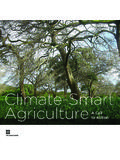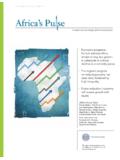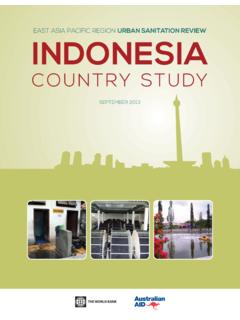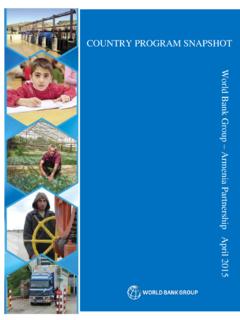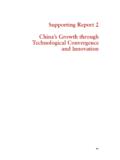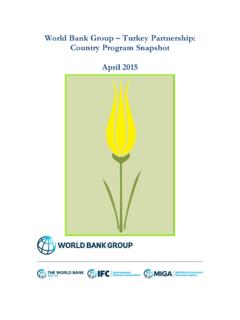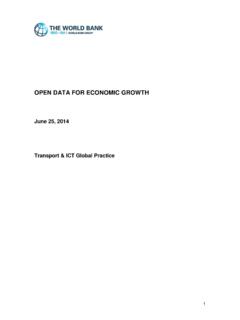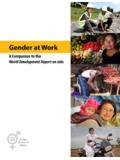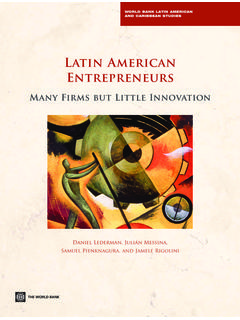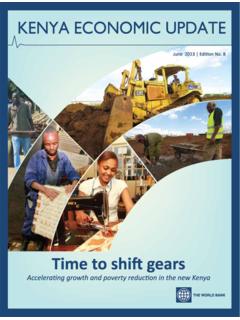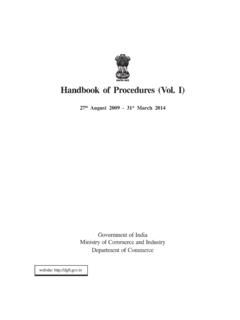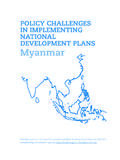Transcription of Land Acquisition and Resettlement Policy Framework
1 1 myanmar agriculture Development Support Project land Acquisition and Resettlement Policy Framework ministry of agriculture and Irrigation The Union Government of myanmar Draft for Public Consultation i Table of Contents Table of Contents .. i Abbreviations and Acronyms .. ii A. Background .. 1 B. The Project .. 1 Project Development Objective .. 1 Project Components .. 1 Institutional Arrangements .. 3 C. Existing Legal and Institutional Frameworks .. 5 land Laws .. 5 Institutions .. 5 D. World Bank OP .. 5 E. Scope of Potential Impacts and Risks .. 6 F. land Acquisition and Resettlement Policy Framework .. 11 Objectives and Principles .. 11 Eligibility .. 13 Implementation/ land Acquisition Action Plan Procedures .. 13 Institutional Arrangements and Responsibilities .. 18 Grievance Redress Mechanism .. 18 Budget .. 20 ii Abbreviations and Acronyms ACC agriculture Coordination Committee ADSP agriculture Development Support Project AMD Agricultural Mechanization Department (in the ministry of agriculture and Irrigation) DAR Department of Agricultural Research (in the ministry of agriculture and Irrigation) DOA Department of agriculture (in the ministry of agriculture and Irrigation) FS feasibility study ID Irrigation Department (in the ministry of agriculture and Irrigation) LRPF land Acquisition and Resettlement Policy Framework LUC land Use Certificate MOAI ministry of agriculture and Irrigation OP Operational Policy PAP project affected people PIC Project Implementation Committee PMU Project Management Unit PSC Project Steering Committee LAAP land Acquisition Action Plan SA Social Assessment SLRD Settlement and land Records Department (in the ministry of agriculture and Irrigation)
2 SA Social Assessment TA Technical Assistance TORs Terms of Reference WUG Water User Group 1 A. Background 1. The Government of myanmar agreed to receive funding from the World Bank for the agriculture Development Support Project (ADSP). The ministry of agriculture and Irrigation (MOAI) is the Implementing Agency. This document provides policies and procedures to be taken under the project in relation to land and asset Acquisition in order to ensure the Project fully complies with the World Bank Operational Policy (OP) Involuntary Resettlement . 2. The project focuses on the rehabilitation of middle-scale surface irrigation schemes in four regions: Bago East, Nay Pyi Taw, Mandalay, and Sagaing. Up to eight such schemes will be supported by the project during its seven year implementation period. The irrigation schemes that will be rehabilitated under the project will be identified based on the feasibility studies (FS) that will be carried out after the project effectiveness.
3 A land Acquisition and Resettlement Policy Framework (LRPF) was prepared during preparation instead of a Resettlement Action Plan. land Acquisition Action Plans (LAAP) will be developed in line with this LRPF and the Bank s OP during implementation. 3. This LRPF was developed based on the Social Assessment (SA) conducted during the project preparation to inform the design of the project, which assessed four pre-identified irrigation schemes in the four project target regions. These four irrigation schemes were selected because they demonstrate some characteristics typical of irrigation schemes in the four target regions. The project may rehabilitate any of these four schemes if its feasibility is ascertained under the FS to be conducted during the implementation based on a more detailed assessment of associated economic, technical, environment and social issues.
4 A full Social Assessment (SA) will be conducted as part of Feasibility Studies (FS) during implementation in line with the Operation Policy , Indigenous Peoples, if the ethnic screening to be conducted during implementation under FS finds that ethnic minorities are present in or have collective attachment to the area of influence of the irrigation schemes that will be supported under the project. 4. The project falls under Environment Category B of the World Bank. Physical relocation of households or large-scale Acquisition of land and/or assets is unlikely to occur. The project affected people (PAP) are mostly direct project beneficiaries, although some non farmers and those farmers who do not receive direct project benefits may also be affected under the rehabilitation of primary and secondary canals as well as under land improvement pilots.
5 B. The Project Project Development Objective 5. The Project Development Objective of ADSP is to increase crop yields and cropping intensity in the selected existing irrigation systems in Bago East, Nay Pyi Taw, Mandalay, and Sagaing regions. This will be achieved through improved irrigation and drainage management and complementary farm advisory and technical services. Project Components 6. The proposed project has four components: (i) Irrigation and Drainage Management; (ii) Farm Advisory and Technical Services; (iii) Project Coordination and Management; and 2 (iv) Emergency Contingency Response. Summary descriptions of each component are as follows. Component 1: Irrigation and Drainage Management 7. The component aims to enhance more flexible and reliable provision of irrigation and drainage services in the project areas to enable an increase in irrigation area coverage and resulting farm productivity.
6 It would address irrigation and drainage management through: (1) focusing on institutional change required for the provision of farmer-responsive irrigation services; and (2) financing the improvement and rehabilitation of irrigation and drainage infrastructure covering about 40,000ha within eight selected schemes in the selected regions. 8. The project s support to institutional improvements includes: development of irrigation and drainage management institutions, their human resources, data collection and management information systems and infrastructure; strengthening of the existing agriculture Coordination Committees (ACCs) as decision making platform for irrigation management for farmers and service delivery agencies; and establishment and strengthening of Water User Groups (WUGs). Competent agencies with adequate technical skills would be hired to help farmers establish and strengthen WUGs.
7 National or international NGOs with a proven experience in participatory approach and community engagement will be hired to monitor project implementation and carry out participatory Monitoring and Evaluation (M&E). 9. The project will also support development of on-farm water management infrastructure and pilot land improvements in 2-3 selected systems. These land improvement pilots will involve the adjustment of existing, irregularly shaped plots into equal-sized, regularly-shaped ones, combined with the land levelling and realignment, and construction of on-farm irrigation and drainage canals and access roads. A competent third-party organization ( an NGO) will be engaged to ensure that all local population including but not limited to direct beneficiaries of the project will actively participate in project implementation and that negative impacts that may fall on them would be minimized or otherwise mitigated.
8 Participatory monitoring and evaluation (M&E) will also be carried out so local population will be given avenues to voice grievances or inquiries directly to the project, under the facilitation of the third party service provider and the presence of local government officials. The third party service provider will work closely with the Department of Irrigation (ID), Settlement and land Records Department (SLRD) and the Project Implementation Committee (PIC) of the township for all activities related to the land improvement pilots. Component 2: Farm Advisory and Technical Services 10. This component facilitates agricultural technology development and adoption activities in the targeted irrigation schemes, which would increase farm productivity and reduce production costs. It will support quality seed production (mainly non-hybrid rice, beans and pulses, and oil crops that are not produced by private sector) by developing farmer-based seed multiplication infrastructure and facilities and strengthen seed supply chains, promote improved fertilizer applications which will be adopted to the variability in soil types in targeted irrigation schemes, help the MOAI and farmers improve the capacity for plant protection through the adoption of Integrated Pest Management techniques.
9 All these agricultural technology development activities and knowledge of improved farming practices will be disseminated to target farmers through improved farm advisory services which are based on farmers' needs and technical constraints, farming systems and market opportunities. The project will also support rehabilitation or construction of village extension education centers, establish field demonstration sites of improved technologies, expand training 3 programs and provide operational and mobility support to MOAI extension staff and subject matter specialists. 11. In response to prevailing good preconditions for profitable farm mechanization in targeted irrigation schemes, the project provide supports farm mechanization through training of MOAI mechanics, testing and demonstration of new climate-smart technologies suitable for smallholder farming systems, and providing mechanization services in the target irrigation systems.
10 The project will also upgrade the capacity of the Meikhtila Mechanization Training Center in Mandalay region through introduction of the modern training methodologies, materials, and upgrade repair workshops, in order to provide more and better vocational training to the staff of MOAI Mechanization Service Stations, farmers, and private sector. It will also support four MOAI Mechanization Service Stations in the project areas, through procurement of machine packages and mobile repair workshops selected in collaboration with the private sectors in order to promote climate-smart mechanization technologies to farmers, provide cost-effective services suitable for smallholder farming systems in Dry Zone, and carry out farmer training. Component 3: Project Coordination and Management 12. The Project Management Unit (PMU) will be established. It will include technical and fiduciary MOAI staff who will be seconded to PMU at a full-time basis from the relevant implementing departments.
